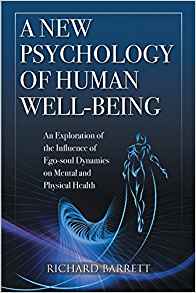Book review by David Lorimer
A NEW PSYCHOLOGY OF HUMAN WELL-BEING
Richard Barrett (SMN)
Fulfilling Books, 2016, 478 pp.
ISBN:978-1-326-59145-8
Much contemporary discussion of well-being has focused on happiness, although the work of Martin Seligman in positive psychology has extended to meaning, an interesting comparison with this ground breaking work by Richard Barrett, where the ego seeks happiness and the soul meaning. As readers of his article above will have seen, he develops a Seven Levels Model incorporating growth in stages of psychological development and operation at corresponding levels of consciousness. His model of health and well-being involves satisfying the ego’s needs as well as the soul’s desires in a developmental process building on the work of Abraham Maslow. One of his important innovations is the contextualisation of the 3-D ego operating within the energetic field of the 4-D soul. He shows how important it is to master each stage as one progresses in order to maintain one’s psychological and physical health.
The 15 chapters explore a larger context for psychology, filtering perception and awareness, motivations of the ego and the soul, stages of psychological development, understanding needs and desires, with a corresponding theory of emotions and feelings. Then there is considerable discussion of the nature of energetic instability and the impact of psychology on physiology at the various stages. This leads finally to a summary of his model. Each chapter contains an admirable summary of the main points.
The deficiency needs of the ego are seen as survival, safety and security. Once one has addressed these issues, one is ready for individuation, shifting the axis of one’s life from ego to the soul and focusing more on transformation. Then the fundamental desires of the soul are for self-expression, connection and contribution. Richard aligns this development broadly with age progression, so that one would typically reach the seventh level of service during one 60s. The reader can appreciate that fear and lack tend to dominate the concerns of the ego, while the soul is already tuned into love and connectedness. Numerous studies, some longitudinal, show that giving and receiving of love is the most fundamental human need and is also correlated with longevity.
Richard believes that the soul already lives in a 4-D awareness of love and connectedness where we recognise ourselves as individuated aspects of the same universal energy field of light and love. Significantly, he says that ‘what we perceive as bonding and cooperation in our 3-D reality is simply 4-D entities attempting to recreate their 4-D reality of connectedness in 3-D conscious awareness.’ (p. 452) Hence ‘love conquers all because it brings us into alignment with the energetic reality of our souls and the universal energy field.’ In this way, the seven stages of psychological development are the recovery of the 4-D reality of the soul in 3-D consciousness. This is what is meant by bringing heaven to earth, which is a fundamental impulse in Christianity. On a personal level, this means moving from fear through trust to love and the process of healing can correspondingly represent caring for the soul. This is an inner longing shared by many.
A particularly original chapter is the one where he speculates about the connection between not mastering a particular stage of development and manifesting corresponding diseases some 5 to 10 years later. He analyses the leading causes of death in relation to age. For instance, the seventh stage of psychological development corresponds to service and the use of the upper mental field – here it seems that continuing to make an active contribution and maintaining a strong sense of purpose and will to live can have a preventative effect on brain related disorders. At all stages, it is important to let go of fear and anger resulting in accumulating pain and leading to energetic instability. Richard shows how management of the emotions is a key in this respect, although the fulfilment of the ego’s needs and the soul’s desires is even more critical. This equally applies to his chapter on suicide and stages of development where people tend to commit suicide ‘when they can no longer bear the pain associated with the struggle to get their needs met at the stage of development they have reached.’
It is clear that individual and cultural evolution are linked, and Richard draws on the work of Spiral Dynamics to show parallels with his own model. Recent events have made it only too clear that people are at very different stages of development, but I do agree that the direction of travel is towards being centred in soul consciousness where one is aware of the underlying unity of life and consciousness and henceforth the importance of enacting the golden rule. Real democracy encourages individual psychological development, which tends to be discouraged by authoritarian regimes and it is hard to disagree with his recipe of promoting policies that enable people to satisfy their deficiency needs and expand educational possibilities leading to greater freedom of expression and hence growth. This is an important contribution to the literature of well-being, all the more so because it includes the perspective of the soul.
Buy A New Psychology of Human Well-Being here.